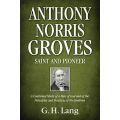Description
Although his name is little known in Christian cirlces today, Anthony Norris Groves (1795-1853) was, according to the writer of this book, one of the most influential men of the nineteenth century. He was what might be termed a spiritual pioneer, forging a path through unfamiliar territory in order that others might follow. One of those who followed him was George Müller, known to the world as one who in his lifetime cared for over ten thousand orphans without any appeal for human aid, instead trusting God alone to provide for the daily needs of this large enterprise.
In 1825 Groves wrote a booklet called Christian Devotedness in which he encouraged fellow believers and especially Christian workers to take literally Jesus’ command not to lay up treasures on earth, but rather to give away their savings and possessions toward the spread of the gospel and to embark on a life of faith in God alone for the necessaries of life. Groves himself took this step of faith: he gave away his fortune, left his lucrative dental practice in England, and went to Baghdad to establish the first Protestant mission to Arabic-speaking Muslims. His going was not in connection with any church denomination or missionary society, as he sought to rely on God alone for needed finances. He later went to India also.
His approach to missions was to simplify the task of churches and missions by returning to the methods of Christ and His apostles, and to help indigenous converts form their own churches without dependence on foreign support. His ideas were considered radical at the time but later became widely accepted in evangelical circles.
Groves was a leading figure in the early days of what Robert Govett would later call the mightiest movement of the Spirit of God since Pentecost—a movement that became known simply as the Brethren. In this book G. H. Lang combines a study of the life and influence of Anthony Norris Groves with a survey of the original principles and practices of the Brethren movement.
Read Sample Material:
Selected Quotations
The Word of God
Features
Quotations
Think not on a holy life, but on a holy moment as it flies; the first overwhelms the heart by its immensity, the other sweetens and refreshes by its lightness and present stimulus; and yet a succession of holy moments constitutes a holy life. —page 57
If your love glows towards Him, you will have almost an instinctive sense of what will please Him, and that will prove to be a holy life, when followed on from day to day. —page 57
Nothing more truly denotes the freedom with which Christ sets free than liberation from the thraldom to money, much or little. —page 75
Oh! when will the day come, when the love of Christ will have more power to unite than our foolish regulations have to divide the family of God? —page 121
How slow we are to learn that all the discipline of life is to prepare us for eternity; that nothing that has not God in it, is either worth caring for or desiring. —page 376



